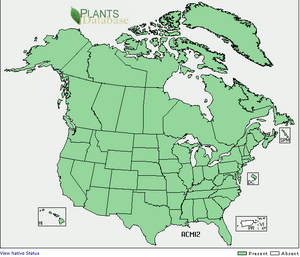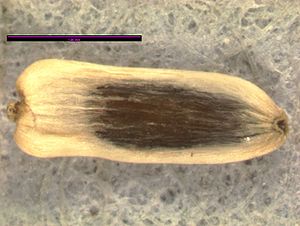Difference between revisions of "Achillea millefolium"
| Line 4: | Line 4: | ||
* Synonyms/Misapplications: ''Achillea'' ''borealis, Achillea'' ''lanulosa'' | * Synonyms/Misapplications: ''Achillea'' ''borealis, Achillea'' ''lanulosa'' | ||
* Codon: ACHMIL | * Codon: ACHMIL | ||
| − | [[File: ACHMIL1.jpg| | + | [[File: ACHMIL1.jpg|500px|thumb|Photo by Ray Izumi, 2009. Also featured on Main Page]] |
== Taxonomy == | == Taxonomy == | ||
Revision as of 19:12, 19 March 2021
- Latin Name: Achillea millefolium
- Family: Asteraceae
- Common Names: milfoil, yarrow
- Synonyms/Misapplications: Achillea borealis, Achillea lanulosa
- Codon: ACHMIL
Contents
Taxonomy
| Achillea millefolium | |
|---|---|
| Scientific classification | |
| Kingdom: | Plantae |
| Subkingdom: | Viridiplantae |
| Phylum: | Tracheophyta |
| Class: | Magnoliopsida |
| Order: | Asterales |
| Family: | Asteraceae |
| Genus: | Achillea L. |
| Species: | Achillea millefolium L. |
| Synonyms | |
| |
Description
Herbaceous perennial growing from rhizomes, from one to several stems up to heights of 8 to 16 inches. Tripinnate and lance-shaped leaves evenly distributed along stem with the leaves becoming smaller towards the top. Leaves typically between 1/4 inch to 1 1/4 inch wide and 1 1/4 inch long to 6 inches long. Flat-topped flower heads (inflorescence) containing 10-20 whitish to yellowish flowers. [2]
Bloom Period
April-October [3]
Distribution
"Widespread throughout North America" [2]
Habitat
Common in open dry to moist areas from high to low elevations; drought tolerant [3]
Uses
Several tribes of the Plains region of the United States including the Pawnee and Chippewa tribes used common yarrow. The Pawnee used the stalk in a treatment for pain relief. The Chippewa used the leaves in a steam inhalant for headaches. They also chewed the roots and applied the saliva to their appendages as a stimulant. The Cherokee drank a tea of common yarrow to reduce fever and aid in restful sleep. [2]
Herbalist Michael Moore also writes that A. millefolium is a great benefit for acute fevers as a hot infusion, that it is an effective hemostatic, and that it helps with irritation of the GI mucosa. [4]
Propagation
Clean seeds with hammer mill then air screen cleaner. Sow in field between May or June and September. Plant 50-70 seeds per foot 1/2" deep or less spaced in 3" rows.
Seed
Seed sample from: 2011
Average Measurement: 1.9 x 0.6 x 0.3
Measurement Range: L: 1.6 - 2.1, W: 0.5 - 1, D: 0.2 - 0.5
Features
Shape: Seed narrowly winged at margins, thicker in the middle. Seed face is narrower at hilum end, broadening at opposite side.
Color: Seed coat papery and white, becoming transparent at the center to reveal a red-brown inner seed.
Surface: Finely longitudinally ridged.
Latitudinal Cross Section: elliptical ![]()
Longitudinal Cross Section: obovate ![]()
Basic Explanations and Assumptions:
The dimensions for the seeds are length x width x depth. The location of the hilum is used as the base of the seed, and the length is measured from hilum to the opposite apex. Where a style is present, the length is measured from the hilum to the bottom of the style. Width is measured at a right angle to the length at the widest part. Depth is measured at a right angle to the intersection of height and width lines.
Measurements included are the mean average for each measurement of ten separate seeds.
All measurements in millimeters unless otherwise noted.
Photo Gallery
References
- ↑ Integrated Taxonomic Information System. Retrieved from https://www.itis.gov/servlet/SingleRpt/SingleRpt?search_topic=TSN&search_value=35423
- ↑ 2.0 2.1 2.2 USDA Plants Profile for Achillea millefolium
- ↑ 3.0 3.1 WTU Image Collection:Plants of Washington
- ↑ Moore, M. (2011). Medicinal plants of the Pacific West. Santa Fe: Museum of New Mexico Press.





